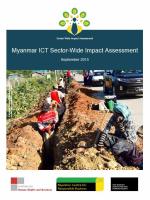
Sector-Wide Impact Assessment of Myanmar’s ICT Sector
The ICT Sector-Wide Impact Assessment (SWIA) presents key human rights risks and opportunities for the Government of Myanmar, companies operating in the sector, and civil society in order to improve the regulation and operations of the sector in a manner that provides benefits to Myanmar, its people, and businesses.
The roll-out of new information and communications technologies (ICT), infrastructure and services in Myanmar is having a transformative impact on the country.
Mobile phone penetration has increased from 7% to 33% between 2012 and 2014, and continues to rise. The growing availability of smartphones is increasing opportunities for Internet access. It has been estimated that by 2030 the ICT sector could contribute $6.4 billion to Myanmar’s GDP and employ approximately 240,000 people.
The SWIA approach was developed by the Myanmar Centre for Responsible Business (MCRB) in partnership with its co-founders, the Institute of Human Rights and Business (IHRB) and the Danish Institute of Human Rights (DIHR), and is intended to support responsible business practices in growing sectors of Myanmar’s economy. SWIA is a forward-looking assessment that aims to contribute to preventing and minimising the sector’s negative impacts as well as strengthening and improving the sector’s positive impacts.
The ICT sector is having a transformative impact on Myanmar at the same time as the country itself is undergoing a transformation: emerging from decades of ethnic-based armed conflict, authoritarian rule and economic isolation. Myanmar is – and will remain for some time – a high-risk country with poor governance. The headlong rush to improve access to ICT services brings challenges, particularly in the absence of adequate policy and legal frameworks. These frameworks are lacking both for the rollout of the network and other services, and for considering and controlling wider impacts on society associated with greater use of ICTs, such as surveillance of communications and “hate speech” online. The gaps in the policy and legal frameworks are compounded by people’s basic lack of experience of using ICT services, resulting in the potential for misuse and negative impacts on a range of human rights, particularly the rights to privacy and freedom of expression.
This means that conducting business responsibly in Myanmar’s ICT sector requires a clear commitment to understanding the complex operating context and its constraints to determine what impacts business activities may have on people in Myanmar. This needs active engagement by companies, Government and civil society to promote public and informed debates, which are still a rarity in Myanmar. This also includes the need for robust approaches to filling in the gaps by managing negative impacts in line with international standards on responsible business conduct.
We strive to make the pdf versions of our publications etc. accessible for screen readers. If you experience any problems, please contact Digital Editor Stine Juhl Nielsen on stni@humanrights.dk
